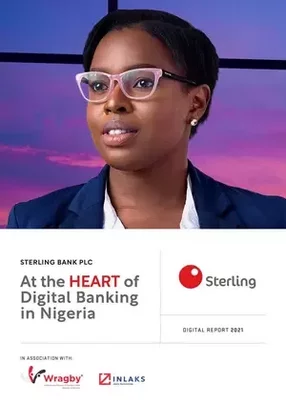Sterling Bank puts HEART into Nigeria’s banking sector
With the majority of its arrows pointing refreshingly upwards, Nigeria’s Sterling Bank had a strong 2020 with key metrics showing deposits up 17.4 percent, and both EPS and Profit After Tax recording 15 percent growth.
After talking online to Olayinka Oni, who doubles up as Chief Information Officer and Chief Digital Officer, it’s not hard to see why the figures are heading in the right direction. He barely pauses with my questions, demonstrating a clear knowledge not only of every facet of the business but perhaps more crucially in these uncertain times, where the fully mobile, cloud-based bank is heading. Previously he was CTO at Microsoft Nigeria, who is now one of Sterling’s key partners.
Underpinning Sterling’s commercial foundations is a simple acronym, HEART, enabling all managers and employees to keep a firm eye on its five key sectors – Healthcare; Education; Agriculture; Renewables and Transportation – and beneath these are eight pivotal secondary markets (Manufacturing, Real Estate, Wholesale & Trading, Power, Public Sector, Mining, Oil and gas, and telecoms).
Nigeria is one of those markets that demands constant focus, with its bustling 200-million population, and 22 million living in the business heartbeat, Lagos, alone; as a consumer-focused bank, Sterling is central to Nigerians’ business and leisure activities.
“When I joined in 2016, it was clear that we needed to find a different way to compete, so we pivoted our strategy to three areas – digital, agility and specialisation. We decided to concentrate on five core growth sectors, that also have a social impact from an outlook standpoint. We always seek to enrich lives.”
We skip through each of the five. He proudly says the bank has made “significant progress” with all of them. While he highlights achievements – such as with blockchain technology that allows commodities trading and tap-and-ride contactless cards – he doesn’t gloss over the challenges, be it COVID, fake drugs or inadequacies in power supplies.
Without diminishing the pandemic’s impact, Sterling appears to have weathered it better than some of its rivals – as its results would indicate. One fortuitous element was last year’s March lockdown which coincided with the launch of the Onebank app, providing consumers with convenient services while living and working from home.
The crisis also prompted changes in employment contracts, with more flexible-work arrangements, as well as significant investment in fraud detection solutions (AI based and built internally) – which in many respects, was simply a continuation of trends that were already underway. “When COVID happened, it was a lot more seamless for us,” he said.
Moving forward, it is looking at the UI experience and thinking about business more from a contactless and digital perspective. “The digital play is open to anyone. On the flip side, internet penetration still has a way to go, so there is a place for the physical. But we’re finding a rapid growth in agency networks – even if physical branches are not growing, and ATM networks are shrinking.
“Another trend we’re finding is embedded banking – that’s an area where we’re more advanced than competitors. There’s no open banking standard in Nigeria yet, but we are taking API and open banking seriously,” he said. “Before anyone in the market embraced data, we appointed a Chief Data Officer and paid a lot more attention to analytics and recommendation services.”
This leads to deeper relationships with third party players – whether providing a wallet or lending as a service. “There is increasingly a lot of desire to adopt blockchain. We’ve used it for commodities but finding an appetite for remittances, as Nigerians are spread all over the world, and there is an active diaspora.”
In recent times, another positive development was the launch of the Specta lending platform, which cut time for approving loans from 48 hours to five minutes. Other eye-catching tools include Doubble by Sterling, an automated investment platform which accepts Naira or US dollars, either in lump sum or scheduled contributions.
“Specta has been a runaway success for us, and helped differentiate us in the market,” he said. “One of our first objectives was to build a mobile and cloud first in strategy, and we are proudly the most advanced user of cloud in the country. Almost every company will become a fintech and if you’re not taking that seriously, you’ll be left behind.”
The four key objectives for Nigeria’s banks, identified by Sterling Bank, are efficient liquidity management; cost efficiency; excellent service delivery and asset protection in order to sustain optimal returns on capital. With his eyes on emerging technologies, Oni is ensuring that all four will flourish in the months and years ahead.


